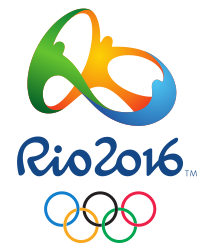
Back Рио-де-Жанеиро 2016 Abkhazian Olimpiese Somerspele 2016 Afrikaans Chuegos Olimpicos de Río de Janeiro 2016 AN الألعاب الأولمبية الصيفية 2016 Arabic اوليمبياد صيف 2016 ARZ গ্ৰীষ্মকালীন অলিম্পিক ২০১৬ Assamese Xuegos Olímpicos de Rio de Janeiro 2016 AST 2016 Yay Olimpiya Oyunları Azerbaijani ۲۰۱۶ یای اولیمپیک اویونلاری AZB Olimpiade Masan Panes 2016 BAN
 Emblem of the 2016 Summer Olympics[A] | |
| Location | Rio de Janeiro, Brazil |
|---|---|
| Motto | A New World (Portuguese: Um mundo novo) |
| Nations | 207 (including IOA and EOR teams)[1] |
| Athletes | 11,180 (6,146 men, 5,034 women)[1] |
| Events | 306 in 28 sports (42 disciplines) |
| Opening | 5 August 2016 |
| Closing | 21 August 2016 |
| Opened by | |
| Closed by | |
| Cauldron | |
| Stadium | Estadio do Maracanã |
Summer Winter
2016 Summer Paralympics | |
| Part of a series on |
| 2016 Summer Olympics |
|---|
The 2016 Summer Olympics (Portuguese: Jogos Olímpicos de Verão de 2016),[C] officially the Games of the XXXI Olympiad (Portuguese: Jogos da XXXI Olimpíada) and officially branded as Rio 2016, were an international multi-sport event held from 5 to 21 August 2016 in Rio de Janeiro, Brazil, with preliminary events in some sports beginning on 3 August. Rio de Janeiro was announced as the host city at the 121st IOC Session in Copenhagen, Denmark, on 2 October 2009.
11,238 athletes from 207 nations took part in the 2016 Games, including first-time entrants Kosovo, South Sudan, and the Refugee Olympic Team.[3][4] With 306 sets of medals, the Games featured 28 Olympic sports, including rugby sevens and golf, which were added to the Olympic program in 2009. These sporting events took place at 33 venues in the host city and at five separate venues in the Brazilian cities of São Paulo, Belo Horizonte, Salvador, Brasília, and Manaus.
These were the first Olympic Games to be held in South America,[5] as well as the first to be held in a Portuguese-speaking country, the first summer edition to be held entirely in the host country's winter season, the first since 1968 to be held in Latin America, and the first since 2000 to be held in the Southern Hemisphere.[6] These were also the first Summer Olympics to take place under the International Olympic Committee (IOC) presidency of Thomas Bach.[4]
The United States topped the medal table, winning the most gold medals (46) and the highest number of medals overall (121); the U.S. team also won its 1,000th Summer Olympic gold medal. Great Britain finished second and became the first country to increase its tally of medals in the Summer Olympiad immediately after being the host nation.[7] China finished third. Host nation Brazil won seven gold medals and 19 total medals, its best result at any Olympics, finishing in thirteenth place. Bahrain, Fiji, Ivory Coast, Jordan, Kosovo, Puerto Rico, Singapore, Tajikistan, and Vietnam all won their first gold medals, as did the group of Independent Olympic Athletes (from Kuwait).
Cite error: There are <ref group=upper-alpha> tags or {{efn-ua}} templates on this page, but the references will not show without a {{reflist|group=upper-alpha}} template or {{notelist-ua}} template (see the help page).
- ^ a b "Rio 2016 Summer Olympics – Results and Video Highlights". Rio2016.com. Rio 2016 Organising Committee for the Olympic and Paralympic Games. 17 April 2018. Archived from the original on 1 August 2012. Retrieved 4 August 2017.
- ^ Gallas, Daniel (12 May 2016). "Michel Temer: The man who now leads Brazil". BBC. Retrieved 12 July 2024.
- ^ "Olympic Athletes". Rio2016.com. Rio 2016 Organising Committee for the Olympic and Paralympic Games. Archived from the original on 21 August 2016. Retrieved 21 August 2017.
- ^ a b "About Rio 2016 Summer Olympics". Rio 2016 Olympics Wiki. Archived from the original on 8 September 2015. Retrieved 31 October 2015.
- ^ Cite error: The named reference
BBC Sport OCwas invoked but never defined (see the help page). - ^ February 2014, Laura Poppick 05 (5 February 2014). "Why Winter Olympics Bypass the Southern Hemisphere". livescience.com. Archived from the original on 23 April 2020. Retrieved 30 March 2020.
{{cite web}}: CS1 maint: numeric names: authors list (link) - ^ Herbert, Ian (21 August 2016). "How many millions each Olympic medal has really cost Britain". The Independent. Archived from the original on 21 August 2016. Retrieved 16 August 2021.